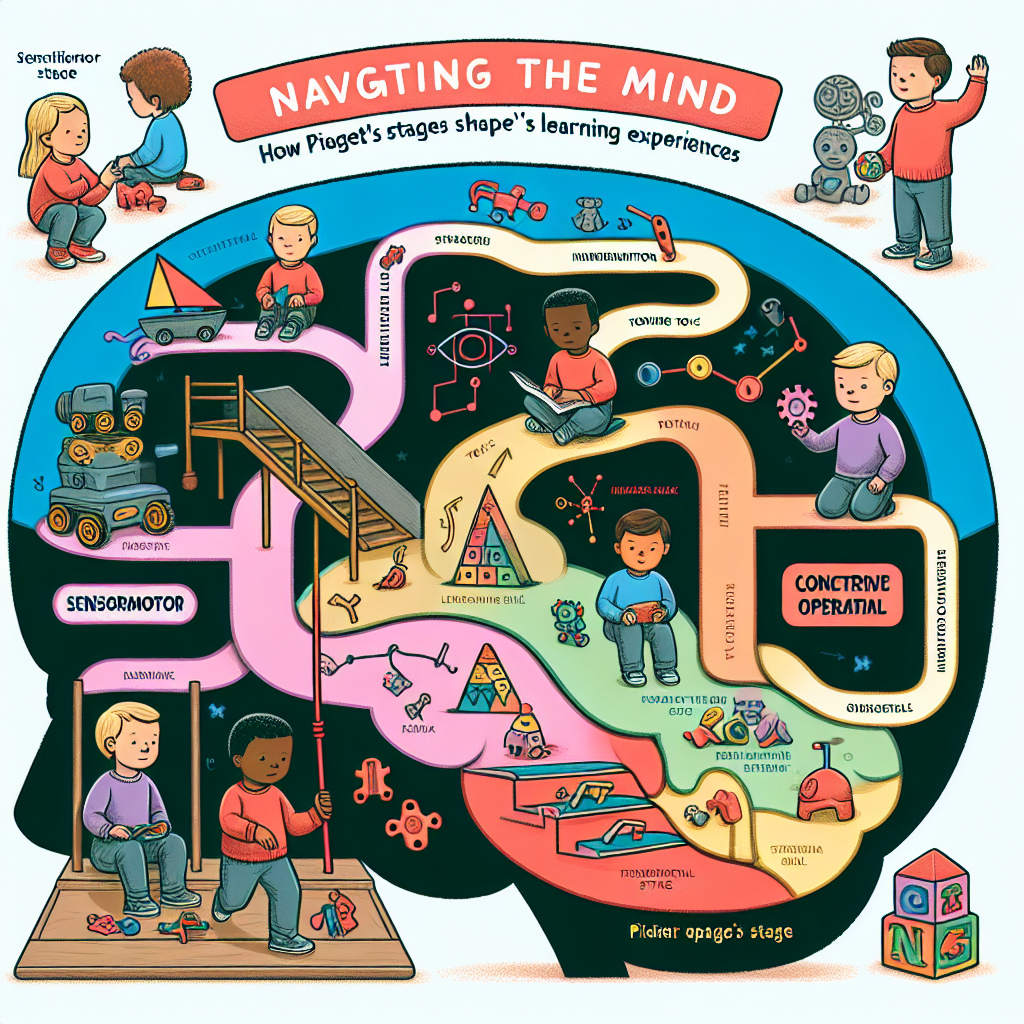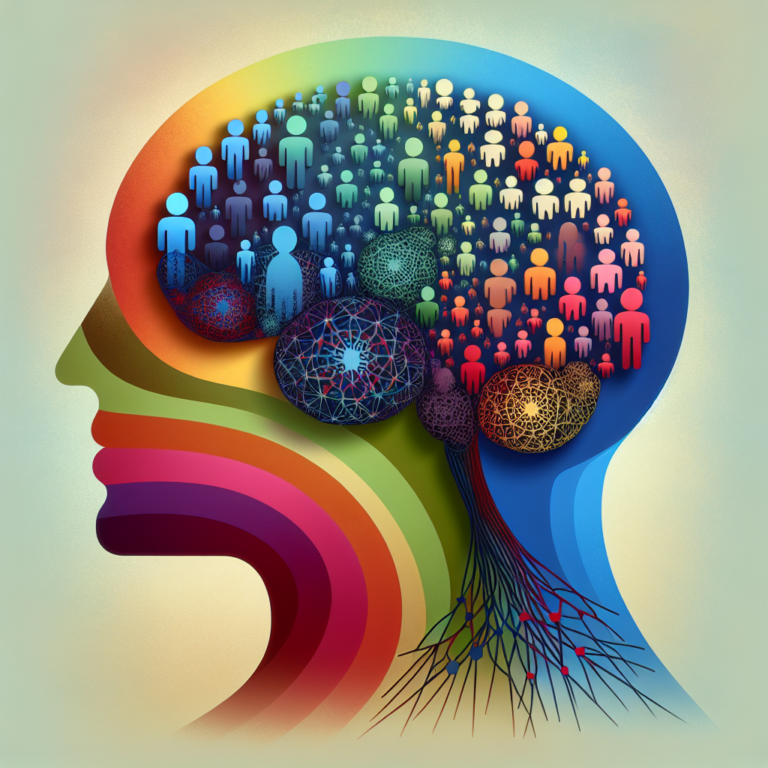
Introduction
Navigating the Mind: How Piaget’s Stages Shape Children’s Learning Experiences is a journey through the cognitive landscape of childhood development, guided by the insights of Jean Piaget—one of the most influential figures in developmental psychology. Understanding Piaget’s stages of cognitive development is not just an academic exercise; rather, it’s a critical lens through which parents, educators, and caregivers can craft enriching learning experiences that resonate with children’s evolving cognitive abilities. As we delve into this exploration, let us unravel how these developmental milestones shape children’s cognitive growth and influence their learning experiences, setting the stage for lifelong learning.
The Foundation of Piaget’s Theory
Jean Piaget proposed that children move through four distinct stages of cognitive development, each characterized by unique ways of thinking and learning. This approach brought a revolutionary perspective to childhood education and psychology, emphasizing that children are not lesser versions of adults but rather thinkers in their own right, with a unique way of navigating their world.
The Four Stages of Piaget’s Cognitive Development
Sensorimotor Stage (Birth to 2 years):
- Key Characteristics: Learning through sensory experiences and manipulating objects.
- Learning Experiences: Infants and toddlers explore the environment, developing object permanence and motor skills.
Pre-operational Stage (2 to 7 years):
- Key Characteristics: Symbolic thinking, egocentrism, and animism.
- Learning Experiences: Language development flourishes, and children engage in pretend play, yet struggle with logical reasoning.
Concrete Operational Stage (7 to 11 years):
- Key Characteristics: Logical thinking about concrete events, understanding the concept of conservation.
- Learning Experiences: Children begin to grasp mathematical concepts, categorize objects, and think logically about concrete situations.
- Formal Operational Stage (12 years and up):
- Key Characteristics: Abstract reasoning and moral reasoning.
- Learning Experiences: Adolescents can think hypothetically and systematically; they can formulate strategies and consider multiple viewpoints.
The Impact of Each Stage on Learning Experiences
Sensorimotor Stage: Exploration and Discovery
During the sensorimotor stage, children are actively learning through their senses and movements. The importance of creating rich sensory experiences cannot be understated. Case studies have shown that sensory play—such as sand and water activities—enhances cognitive development by allowing infants to explore and learn through tactile engagement.
Case Study: The Sensory Playground
A local preschool introduced a sensory playground designed for children in the sensorimotor stage. By incorporating tactile elements like water tables and sandboxes, children displayed increased engagement and curiosity, which vitalized their exploratory learning. Analyzing this, we see how fostering exploratory environments can enhance cognitive pathways in young children.
Pre-operational Stage: The Power of Imagination
As children transition to the pre-operational stage, teachers and caregivers can harness the power of imagination. This stage is pivotal for language and creative thinking, where storytelling becomes a fundamental learning tool.
Case Study: Storytelling in the Classroom
A kindergarten teacher implemented daily storytelling sessions, intertwining narrative with physical activities. As children acted out stories, their vocabulary expanded, and social skills were refined through collaborative play. This case illustrates that engaging children’s imaginations can significantly enhance their learning experience during the pre-operational stage.
Concrete Operational Stage: Logical Thinking Takes Shape
In the concrete operational stage, children develop the ability to think logically about concrete events. Educators can facilitate hands-on activities that promote mathematical and scientific reasoning, thereby making abstract concepts more tangible.
Case Study: The Math Camp
A summer math camp for elementary students emphasized hands-on learning through real-world applications. Children engaged in activities such as cooking, where they measured ingredients, converting measurements, and applying addition and subtraction in practical contexts. This not only made math concrete but ignited a passion for numbers, showing that real-world applications can bridge the gap between theory and practice during this stage.
Formal Operational Stage: Embracing Abstract Thought
As students enter the formal operational stage, educators can challenge them with opportunities for critical thinking and problem-solving. Encouraging debates and exploring moral dilemmas can foster deeper cognitive engagement.
Case Study: The Debate Club
A high school debate club allowed students to research, formulate, and defend their views on complex issues. This initiative nurtured their ability to think abstractly and critically, demonstrating that engaging adolescents in intellectual discourse promotes sophisticated cognitive skills, fostering an environment ripe for comprehensive learning experiences.
Integrating Piaget’s Stages into Educational Curricula
Navigating the Mind: How Piaget’s Stages Shape Children’s Learning Experiences is not just an academic concept; it’s a practical framework that can be integrated into educational curricula to enhance engagement and learning outcomes.
Developmentally Appropriate Practices (DAP)
Educators should employ Developmentally Appropriate Practices (DAP) that align with Piaget’s stages:
Tailored Learning Centers: Create centers that cater to the developmental stages, from sensory tables for the youngest learners to debate spaces for older students.
Flexible Grouping: Utilize mixed-age groups to foster peer learning, especially during the concrete operational stage close to adults who can model complex thinking.
- Inquiry-Based Learning: Encourage students to ask questions and explore topics of interest, allowing them to construct knowledge actively.
The Role of Parents and Caregivers
The influence of parents extends beyond the classroom. They are co-navigators in the cognitive journey, providing essential support that shapes children’s learning experiences.
- Encouragement: Engage in play and learning activities that stimulate curiosity.
- Language Development: Create an environment rich in language, reading, and storytelling to enhance cognitive progression.
Effective partnerships between parents and educators can create a cohesive approach to children’s development, fostering richer and more engaging learning experiences throughout each stage.
Challenges and Misconceptions
Overemphasis on Stages
One common misconception is that children strictly adhere to these stages within specific age brackets. In reality, children may display behaviors characteristic of different stages simultaneously.
Cultural and Individual Differences
Piaget’s stages have been critiqued for not fully accounting for cultural and individual variations in learning. Some children may exhibit cognitive skills influenced by their backgrounds, environments, and experiences.
Limiting Collaborative Learning
Another challenge lies in the overemphasis on individual learning. Promoting collaboration among children fosters social skills and enriches cognitive development, aligning with Piaget’s belief in the social nature of learning.
Conclusion
Navigating the Mind: How Piaget’s Stages Shape Children’s Learning Experiences provides invaluable insights into creating meaningful learning opportunities that resonate with children’s natural cognitive development. Understanding these stages empowers educators and parents to foster rich learning environments that not only enhance academic growth but also nurture the essential skills children need for lifelong learning.
As we celebrate the strides made in understanding cognitive development, let us remember that each child’s journey is unique. By prioritizing developmentally appropriate practices that align with Piaget’s theory, we can help children explore, imagine, and engage with the world around them in impactful ways.
FAQs
1. What are Jean Piaget’s four stages of cognitive development?
Jean Piaget’s four stages include the Sensorimotor (birth-2 years), Pre-operational (2-7 years), Concrete Operational (7-11 years), and Formal Operational (12 years and up) stages.
2. How can I apply Piaget’s theory at home?
Encourage exploration through age-appropriate play, read daily to bolster language skills, and engage in discussions that promote critical thinking.
3. Are there variations in how children progress through Piaget’s stages?
Yes, children may progress at different rates. Factors like culture, education, and individual experiences can affect their cognitive development.
4. How do I create a learning environment that aligns with Piaget’s stages?
Develop learning centers tailored to each stage, encourage open-ended play, and integrate hands-on activities that stimulate cognitive growth.
5. Why is understanding Piaget’s stages important?
It helps caregivers and educators create supportive learning environments that cater to children’s cognitive and emotional needs, ultimately enhancing their learning experiences.
By equipping ourselves with these insights, we can ensure that each child’s cognitive journey is one of curiosity, exploration, and profound learning.















